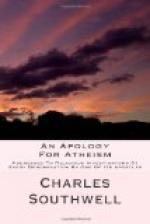Religion is the curse of Ireland. To the rival churches of that country may be traced nearly all the oppressions suffered by its people, who never can be materially improved till purged of their faith in priests. When that salutary work shall be accomplished, Ireland will indeed be ’a nation’ in the secure enjoyment of political liberty. The priest-ridden may talk of freedom, but can never secure it; for, as truly said by one of our most admired poets—
Tis
man’s base grovelling nature makes the priest,
Who
always rides a superstitious beast.
And he is a poor politician who expects to see political liberty achieved or enjoyed by nations made up of ‘base, grovelling’ specimens of human nature.
What then can be thought of the first-rate reformers before alluded to, who are going to emancipate every body without the least offence to any body’s superstition? It should be borne in memory that other people are superstitious as well as the Irish, and that the churches of all countries are as much parts of ‘a wicked political system’ as are the churches of Ireland. The judges of our own country frequently remind us that its laws have a religious sanction; nay they assure us Christianity is part and parcel of those laws. Do we not know that orthodox Christianity means Christianity as by law established? And can any one fail to perceive that such a religion must needs be political? The cunning few, who make a market of delusion, and esteem nothing apart from their own aggrandisement, are quite aware that the civil and criminal law of England is intimately associated with Christianity—they publicly proclaim their separation impossible, except at the cost of destruction to both. They are sagacious enough to perceive that a people totally untrammelled by the fears, the prejudices, and the wickedness of religion would never consent to remain in bondage.
Hence the pains taken by piety-mongers to perpetuate the dominion of that ignorance which proverbially is ‘the mother of devotion.’ What care they for universal emancipation? Free themselves, their grand object is to rivet the chains of others. So that those they defraud of their hard earned substance be kept down, they are not over scrupulous with respect to means. Among the most potent of their helps in the ‘good work’ are churches, various in name and character, but in principle the very same. All are pronounced true by priests who profit by them, and false by priests who do not. Every thing connected with them bears the mark of despotism. Whether we look at churches foreign or domestic, Popish or Protestant, that mark of the ‘beast’ appears in characters as legible as, it is fabled, the hand writing on the wall did to a tyrant of old. In connection with each is a hierarchy of intellect stultifiers, who explain doctrines without understanding them, or intending they should be understood by others; and true to their ‘sacred trust,’ throw




